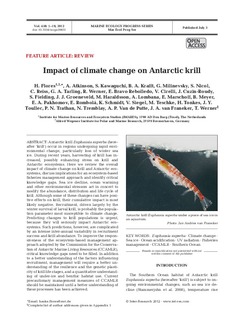| dc.contributor.author | Flores, Humberto | |
| dc.contributor.author | Atkinson, A. | |
| dc.contributor.author | Kawaguchi, So | |
| dc.contributor.author | Krafft, Bjørn A. | |
| dc.contributor.author | Milinevsky, Gennadi | |
| dc.contributor.author | Nicol, Stewart | |
| dc.contributor.author | Reiss, Christian | |
| dc.contributor.author | Tarling, Geraint Andrew | |
| dc.contributor.author | Werner, R. | |
| dc.contributor.author | Rebolledo, E. Bravo | |
| dc.contributor.author | Cirelli, V. | |
| dc.contributor.author | Cuzin-Roudy, J. | |
| dc.contributor.author | Fielding, Sophie | |
| dc.contributor.author | Groeneveld, J.J. | |
| dc.contributor.author | Haraldsson, Matilda | |
| dc.contributor.author | Lombana, Alfonso V. | |
| dc.contributor.author | Marschoff, Enrique R. | |
| dc.contributor.author | Meyer, Bettina | |
| dc.contributor.author | Pakhomov, Evgeny A. | |
| dc.contributor.author | Rombola, Emilce | |
| dc.contributor.author | Schmidt, Katrin | |
| dc.contributor.author | Siegel, Volker | |
| dc.contributor.author | Teschke, Mathias | |
| dc.contributor.author | Tonkes, Henrieke | |
| dc.contributor.author | Toullec, Jean-Yves | |
| dc.contributor.author | Trathan, Philip N. | |
| dc.contributor.author | Tremblay, Nelly | |
| dc.contributor.author | Van de Putte, Anton Pieter | |
| dc.contributor.author | van Franeker, Jan Andries | |
| dc.contributor.author | Werner, Thorsten | |
| dc.date.accessioned | 2012-11-13T18:27:26Z | |
| dc.date.available | 2012-11-13T18:27:26Z | |
| dc.date.issued | 2012-07-03 | |
| dc.identifier.issn | 0171-8630 | |
| dc.identifier.issn | 1616-1599 | |
| dc.identifier.uri | http://hdl.handle.net/11250/109124 | |
| dc.description.abstract | Antarctic krill Euphausia superba (hereafter
‘krill’) occur in regions undergoing rapid environmental
change, particularly loss of winter sea
ice. During recent years, harvesting of krill has in -
creased, possibly enhancing stress on krill and
Antarctic ecosystems. Here we review the overall
impact of climate change on krill and Antarctic ecosystems,
discuss implications for an ecosystem-based
fisheries management approach and identify critical
knowledge gaps. Sea ice decline, ocean warming
and other environmental stressors act in concert to
modify the abundance, distribution and life cycle of
krill. Although some of these changes can have positive
effects on krill, their cumulative impact is most
likely negative. Recruitment, driven largely by the
winter survival of larval krill, is probably the population
parameter most susceptible to climate change.
Predicting changes to krill populations is urgent,
because they will seriously impact Antarctic eco -
systems. Such predictions, however, are complicated
by an intense inter-annual variability in recruitment
success and krill abundance. To improve the responsiveness
of the ecosystem-based management ap -
proach adopted by the Commission for the Conservation
of Antarctic Marine Living Resources (CCAMLR),
critical knowledge gaps need to be filled. In addition
to a better understanding of the factors influencing
recruitment, management will require a better un -
derstanding of the resilience and the genetic plasticity
of krill life stages, and a quantitative understanding
of under-ice and benthic habitat use. Current
precautionary management measures of CCAMLR
should be maintained until a better understanding of
these processes has been achieved. | no_NO |
| dc.language.iso | eng | no_NO |
| dc.publisher | Inter-Research | no_NO |
| dc.subject | climate change | no_NO |
| dc.subject | klimaendringer | no_NO |
| dc.subject | ocean acidification | no_NO |
| dc.subject | havforsuring | no_NO |
| dc.subject | fisheries management | no_NO |
| dc.subject | fiskeriforvaltning | no_NO |
| dc.subject | krill | no_NO |
| dc.title | Impact of climate change on Antarctic krill | no_NO |
| dc.type | Journal article | no_NO |
| dc.type | Peer reviewed | no_NO |
| dc.subject.nsi | VDP::Mathematics and natural science: 400::Zoology and botany: 480::Marine biology: 497 | no_NO |
| dc.subject.nsi | VDP::Mathematics and natural science: 400::Zoology and botany: 480::Ecotoxicology: 489 | no_NO |
| dc.subject.nsi | VDP::Agriculture and fishery disciplines: 900::Fisheries science: 920::Fish health: 923 | no_NO |
| dc.source.pagenumber | 1-19 | no_NO |
| dc.source.volume | 458 | no_NO |
| dc.source.journal | Marine Ecology Progress Series | no_NO |
| dc.identifier.doi | http://dx.doi.org/10.3354/meps09831 | |
